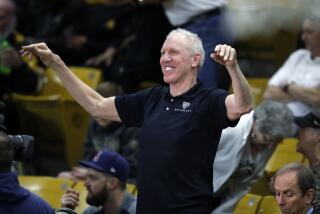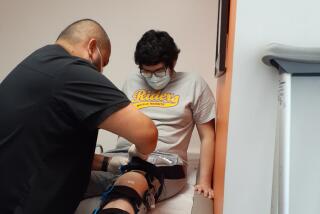THE BEN JOHNSON STEROID INQUIRY : Francis Went to Great Lengths to Help His Athletes
- Share via
TORONTO — Although he had graduated from Stanford University five years before with a major in political science and a minor in history, Charlie Francis was a bored insurance underwriter in his native Toronto when he got the call in 1976 to help coach a suburban track and field club.
Francis didn’t have to think twice before accepting. A former sprinter who had competed for Canada at the 1972 Summer Olympics at Munich, he soon developed a reputation as a devoted mentor, who often dipped into his own pockets to pay his athletes’ expenses, and an outstanding coach, who developed some of the world’s best sprinters even though they worked out in a place they called the Pig Palace.
He also became known in international circles as “Charlie the Chemist” because of his expertise in performance-enhancing drugs, particularly anabolic steroids.
Francis, 40, displayed his depth of knowledge in that field Wednesday, testifying before the Canadian government’s inquiry into international sport that he was instrumental in the drug use of 11 of his athletes, including Ben Johnson, world record-holder in the 100 meters.
After winning the gold medal and setting a world record at the 1988 Summer Olympics in Seoul, Johnson was disqualified when he tested positive for an anabolic steroid. Since then, Francis has been suspended with pay from coaching by Sport Canada.
In four hours of testimony Wednesday, exhaustive but never dull, Francis also implicated athletes from eight countries, primarily the United States. Even though rumors have been rampant for years about drug use in the sport, it was the first time that anyone with such a grasp of the issue has been so explicit in public. Not only were his comments on the record, he made them while under oath.
Track and field may never entirely recover.
But on Tuesday, his first day of testimony, a portrait was presented of a man who has so much passion for the sport that he quit his insurance job in 1978 to become a full-time, albeit unpaid, coach for the Scarborough Optimists Track and Field Club. Even though it was the Toronto area’s most successful organization for youth sports, the athletes had no place to train except for the Swine Pavilion--”the Pig Palace”--on the grounds of Canada’s National Exhibition, near the home stadium of the Toronto Blue Jays.
To support himself, Francis sold his Aston-Martin and, at 30, moved back in with his parents.
Most of that type information was supplied by the inquiry’s co-counsel, Robert P. Armstrong, who said that he had to prod Francis for it. Reporters kidded Armstrong afterward that he was creating another St. Francis.
Armstrong said that Francis often footed at least half the bill for the club’s annual tours. Because most of the young athletes were poor, the majority having immigrated from the West Indies, Francis also sometimes had to make sure they were properly fed.
“The boyfriend of one of our girls told me that she was eating Fruit Loops for dinner,” Francis said after he was asked by Armstrong to tell the story. “Obviously, that had to stop. I went out and bought them some groceries.”
He recalled another occasion when Johnson and his older brother, Eddie, had only $6 between them for a three-day trip. Upon discovering that when they asked for one order of french fries to share at the first meal, he gave them money.
A few years later, after he began receiving a $25,000 annual salary as a national coach from Sport Canada and Sport Ontario, Francis said he still refused to take a percentage of his athletes’ earnings, although several of them were beginning to emerge as world-class runners.
“It seemed kind of pathetic to take a fee and then give it back to them the next time they needed a meal,” he said.
It was only after he acquired an agent for Johnson and other athletes in 1985 that Francis said he accepted a cut, a one-time payment of $20,000.
During Wednesday’s testimony, the lengths that Francis would go to help his athletes gain recognition as world-class became further apparent. He introduced many of them to performance-enhancing drugs.
He said that he first learned of anabolic steroids from other athletes at Stanford from 1967-71. Francis, whose hand-timed 10.1 in the 100 meters in 1970 was tied for fifth-fastest in the world, said that he competed drug-free through 1972, when he represented Canada in the Summer Olympics. He was eliminated in the quarterfinals of the 100 meters because of a leg injury, but he said his eyes were opened.
“Rumors in Munich were that the level of use among top-level (track and field athletes) was 80%,” Francis said.
In 1973, when he won his second national championship in the 100, he said that he was assisted by the most popular anabolic steroid of the day, Dianabol.
“During that period, I was working, and it was very difficult for me to maintain a proper training program,” he said. “To get myself back to a world level, I became actively interested in steroids and where I could obtain them for myself.”
A doctor prescribed the Dianabol, which Francis said he used for three weeks.
“I lost weight, and I gained muscle mass,” he said. “I felt generally improved. I felt more confident. The emotional effect was apparent. Physically, I felt much better leading into that championship.”
He said that he felt no adverse side effects from the steroid use.
Despite his confidence in the drugs, particularly after some of his athletes, especially Johnson, began to show extraordinary results with no discernible side effects, Francis said that he still believed he needed additional firsthand knowledge.
He said that when the physician used by most of the athletes, Dr. Jamie Astaphan, prescribed a new steroid for them in 1986, Francis also asked for a prescription.
“I wanted to know the effect of it,” he said. “I was getting back into shape. My weightlifting improved quite rapidly. I went from a bench press of 200 pounds to 320 within five weeks.”
Because of the suspension, his future in coaching is in doubt.
But his immediate future is determined. He could be asked to testify through the middle of next week.
More to Read
Go beyond the scoreboard
Get the latest on L.A.'s teams in the daily Sports Report newsletter.
You may occasionally receive promotional content from the Los Angeles Times.






